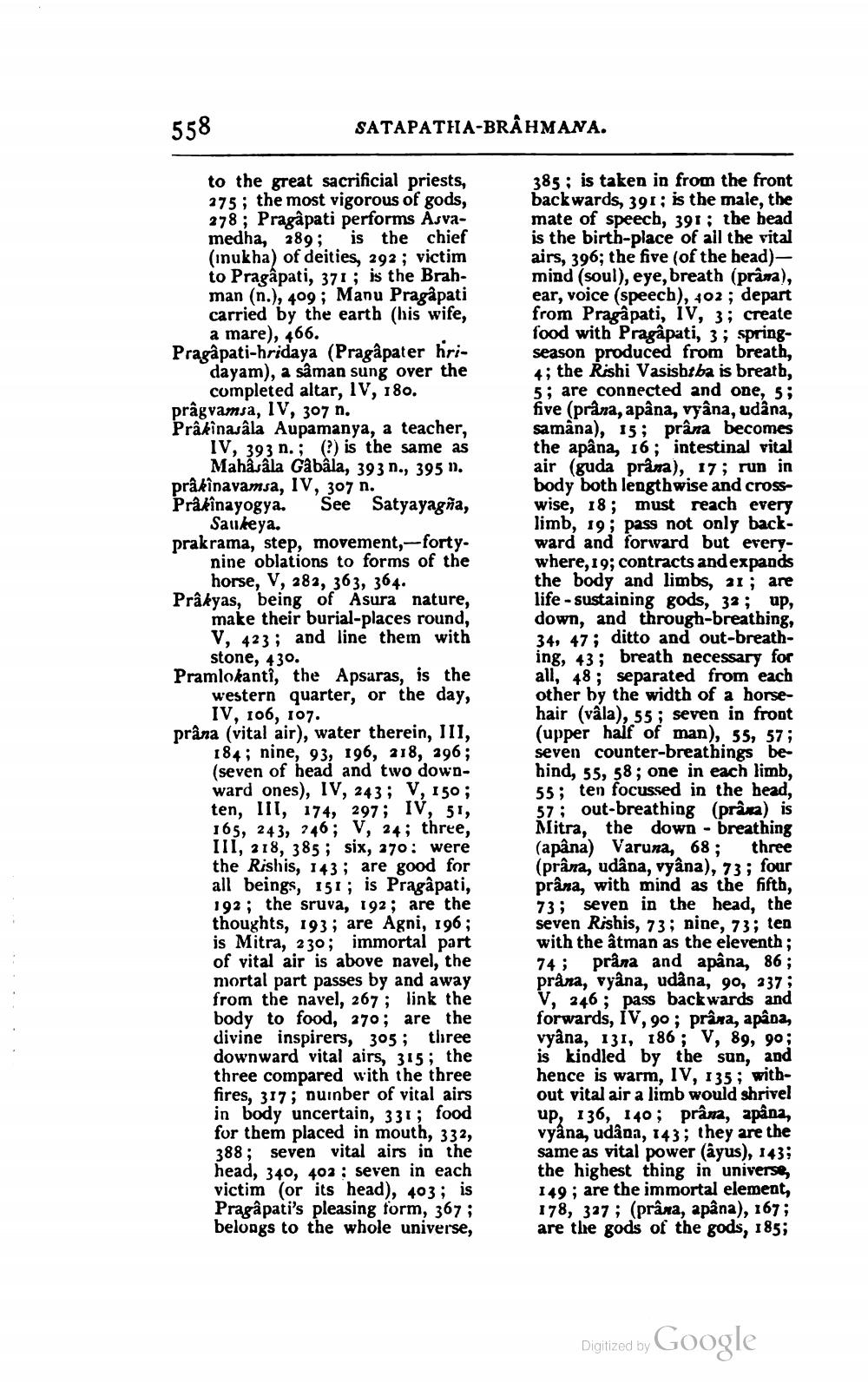________________
558
to the great sacrificial priests, 275; the most vigorous of gods, 278; Pragâpati performs Asvamedha, 289; is the chief (inukha) of deities, 292; victim to Pragâpati, 371; is the Brahman (n.), 409; Manu Pragâpati carried by the earth (his wife, a mare), 466. Pragâpati-hridaya (Pragâpater hridayam), a sâman sung over the completed altar, IV, 180. prâgvamsa, IV, 307 n. Prâkinasâla Aupamanya, a teacher, IV, 393 n.; (?) is the same as Mahâsâla Gâbâla, 393 n., 395 m. prâkînavamsa, IV, 307 n. Prâkînayogya. See Satyayagña,
Saukeya.
SATAPATHA-BRAHMANA.
prakrama, step, movement,-fortynine oblations to forms of the horse, V, 282, 363, 364. Prâkyas, being of Asura nature, make their burial-places round, V, 423; and line them with stone, 430. Pramlokanti, the Apsaras, is the western quarter, or the day, IV, 106, 107.
prâna (vital air), water therein, III, 184; nine, 93, 196, 218, 296; (seven of head and two downward ones), IV, 243; V, 150; ten, III, 174, 297; IV, 51, 165, 243, 246; V, 24; three, III, 218, 385; six, 270: were the Rishis, 143; are good for all beings, 151; is Pragâpati, 192; the sruva, 192; are the thoughts, 193; are Agni, 196; is Mitra, 230; immortal part of vital air is above navel, the mortal part passes by and away from the navel, 267; link the body to food, 270; are the divine inspirers, 305; three downward vital airs, 315; the three compared with the three fires, 317; nuinber of vital airs in body uncertain, 331; food for them placed in mouth, 332, 388; seven vital airs in the head, 340, 402; seven in each victim (or its head), 403; is Pragâpati's pleasing form, 367; belongs to the whole universe,
385 is taken in from the front backwards, 391; is the male, the mate of speech, 391; the head is the birth-place of all the vital airs, 396; the five (of the head)mind (soul), eye, breath (prana), ear, voice (speech), 402; depart from Pragâpati, IV, 3; create food with Pragâpati, 3; springseason produced from breath, 4; the Rishi Vasishtba is breath, 5; are connected and one, 5; five (prâza, apâna, vyâna, udâna, samâna), 15; prâna becomes the apâna, 16; intestinal vital air (guda prana), 17; run in body both lengthwise and crosswise, 18; must reach every limb, 19; pass not only backward and forward but everywhere, 19; contracts and expands the body and limbs, 21; are life-sustaining gods, 32; up, down, and through-breathing, 34, 47; ditto and out-breathing, 43; breath necessary for all, 48; separated from each other by the width of a horsehair (vala), 55; seven in front (upper half of man), 55, 57; seven counter-breathings behind, 55, 58; one in each limb, 55; ten focussed in the head, 57; out-breathing (prâxa) is Mitra, the down-breathing (apâna) Varuna, 68; three (prâna, udâna, vyâna), 73; four prâna, with mind as the fifth, 73; seven in the head, the seven Rishis, 73; nine, 73; ten with the âtman as the eleventh; 74; pråna and apâna, 86; prana, vyâna, udâna, 90, 237; V, 246; pass backwards and forwards, IV, 90; prâxa, apâna, vyâna, 131, 186; V, 89, 90; is kindled by the sun, and hence is warm, IV, 135; without vital air a limb would shrivel up, 136, 140; prâna, apâna, vyâna, udâna, 143; they are the same as vital power (âyus), 143; the highest thing in universe, 149; are the immortal element, 178, 327; (prâna, apâna), 167; are the gods of the gods, 185;
Digitized by
Google




